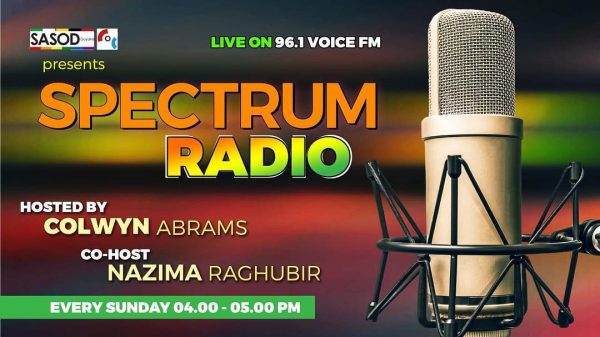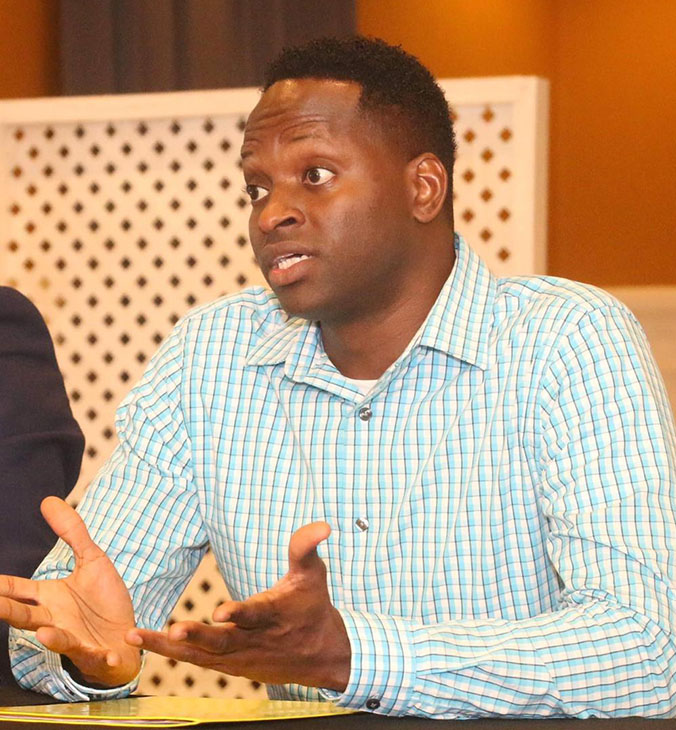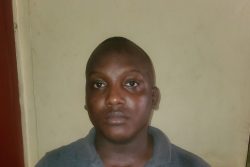With its news radio programme, the Society Against Sexual Orienta-tion Discrimination (SASOD) has been seeking to widen its reach for advocacy and to create a space for voices that do not yet have a place within Guyana’s mainstream media, according to its Managing Director and Founder Joel Simpson, who says it has yielded some success.
“A huge part of SASOD’s mandate is to educate the Guyanese public about sexual and gender diversity so that we reduce all forms of homophobia, lesbophobia, biphobia and transphobia in the country. So we’ve always wanted both a regular radio programme and a regular television programme as an outlet to be able to educate the public,” Simpson told Sunday Stabroek in an interview.
Since September, SASOD’s Spectrum Radio has been aired weekly on 96.1 FM.
 “The opportunity to have the radio programme actually came to us after Mr Nigel Blackman, who owns 96.1 and HBTV Channel 9, reached out to us very early on before he got his radio licence and said he’s waiting on his licence but he is considering starting the programme online… He said he has been following our work and he’s an admirer and supporter and asked if we’d like to have a programme to use as an outlet to educate the public,” Simpson explained.
“The opportunity to have the radio programme actually came to us after Mr Nigel Blackman, who owns 96.1 and HBTV Channel 9, reached out to us very early on before he got his radio licence and said he’s waiting on his licence but he is considering starting the programme online… He said he has been following our work and he’s an admirer and supporter and asked if we’d like to have a programme to use as an outlet to educate the public,” Simpson explained.
With the programme, which is also being video-streamed online, he believes that SASOD is giving an important platform to persons in the lesbian, gay, bisexual, and transgender (LGBT) community who would not have been heard or seen otherwise. “We are unearthing voices that have not been heard and don’t have a place in the mainstream media… I think it has been successful based on our feedback, from the kinds of comments and shares we see on social media. In fact, one young person actually remarked that as a young queer person he is so happy to be growing up in a time when the LGBT community has a voice. And if you think about it, prior to now, there was no regular presence of the LGBT voices in the mainstream media, and faces,” Simpson said.
Currently, the programme runs every Sunday from 4pm to 5pm and focuses on a range of topics and it features guests from the LGBT community.
Simpson noted that they chose to the Sunday afternoon timeslot since they are of the opinion that during that time they would be able to reach their widest demographic since most persons are usually at home preparing for school or work.
“So far, it has been great. The station is new, so we don’t have any data on listenership from the station as yet and we don’t do calls as yet. But we do a live Facebook video of the entire programme where people post questions, which has been very good,” he added.
He said that the interactions on Facebook for the radio programme have been tremendous, which is evident from the amount of feedback they receive through comments, shares and regular views. “We had one of our guests speak publicly for the first time about being a survivor of gender-based violence and it helps to broaden the conversation and perspective on violence against women because we see cisgender women in the newspapers being killed and murdered all the time but there’s also gender-based violence affecting lesbians, bisexual and transwomen but you won’t hear about it because of the stigma associated with sexualities and transgenderism that make those people not want to go to the police to report these issues,” he further explained.
Apart from the radio programme Simpson pointed out that SASOD has been embracing social media and its evolution since being founded 15 years ago to broaden its avenues to reach out to the LGBT community.
He said that they first started out by using Yahoo! Groups to communicate with the community and currently it uses social media platforms such as Instagram, Facebook and YouTube.
“So SASOD started out with using ICT (Information Communications Technology) generally as a strategy. When we started working 15 years ago, one of the struggles, which Spectrum Radio is now able to provide a platform to deal with, is that we weren’t finding persons to come forward and tell their stories of discrimination, their coming out stories and so on. So we first started using social media through our Yahoo! Groups as a platform where people could be in the group and use any email and not have to self-identify by using real names and faces and that was a space for people to contribute,” he noted.
However, over the last 15 years, their social media’s presence has grown tremendously. According to Simpson, last year SASOD organised a social media campaign on Instagram following the International Day Against Homophobia where it encouraged persons to submit short videos telling their coming out stories.
Initially, he said, they were not optimistic that the campaign would’ve seen many participants but were pleasantly surprised when the numbers kept climbing.
“When we started it, we thought nobody who hasn’t told their stories would do this and we were surprised that we got people to submit and who were willing to come into our office and be videoed. Gay men, lesbians, trans-persons. We got persons submitting stories from Suriname, which we were also surprised about and they were so powerful in so many ways because people are often prejudiced because they oppose an abstract idea so they are told that homosexuality is wrong for whatever reasons,” Simpson explained. He added that the videos weren’t greeted with only applause; they were also met with opposing comments.
However, he said, he believes that such an environment, once it is not hostile or disrespectful, is conducive to fostering an open conversation on LGBT issues where misperceptions can be cleared. Simpson said that SASOD wants to create a safe space for everyone that allows people to also voice their disagreement in order to foster a healthy conversation and discussion.
While using social media allows SASOD to broaden its reach to places it would not be able to regularly visit, such as the hinterland and interior areas, Simpson said its dedication to activism through social media will not replace face-to-face interactions, which are invaluable.
“Technology gives us options and access that we would otherwise not have. However, at the same time we are not going to discount the irreplaceable value of interpersonal face-to-face interactions, especially with key stakeholders who interact with the LGBT community, and whose interactions can determine whether their rights are respected and protected,” he emphasised.
He also noted that over the years, social media has played a major role in the growth of SASOD since a lot of persons would have learnt about its work through its social media pages. He also related that social media plays a key role in connecting persons from the diaspora, who otherwise would not be able to communicate and assist the organisation.
In terms of the immediate plans for the radio programme, Simpson said that SASOD is working towards getting advertisements to sponsor the show. After that, it will be working towards turning the hour-long programme into two hours. With an additional hour, it will be able to have an LGBT global news roundup, which he said, persons have indicated an interest in.








